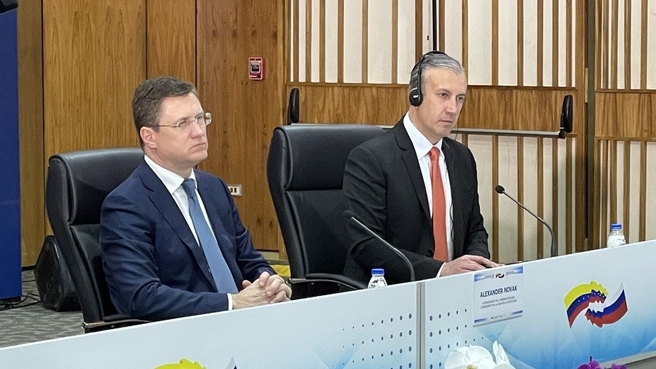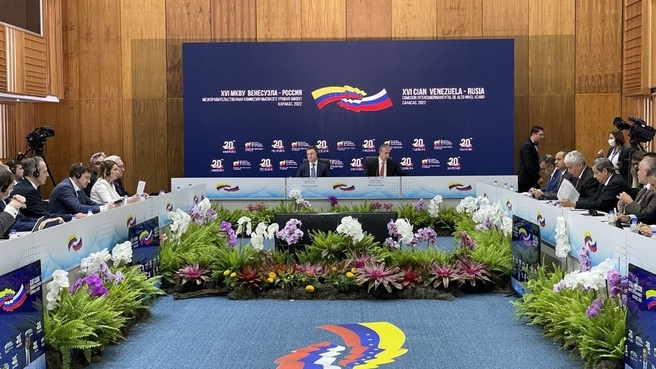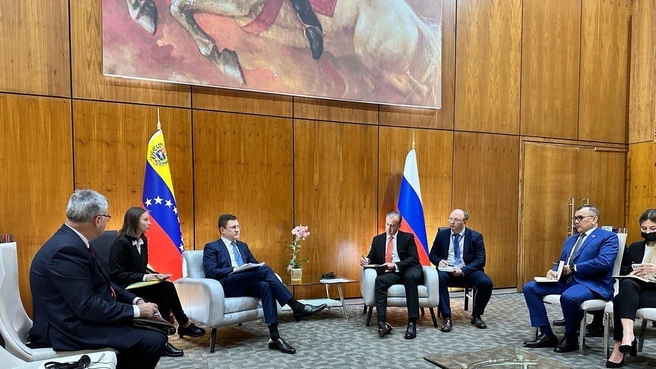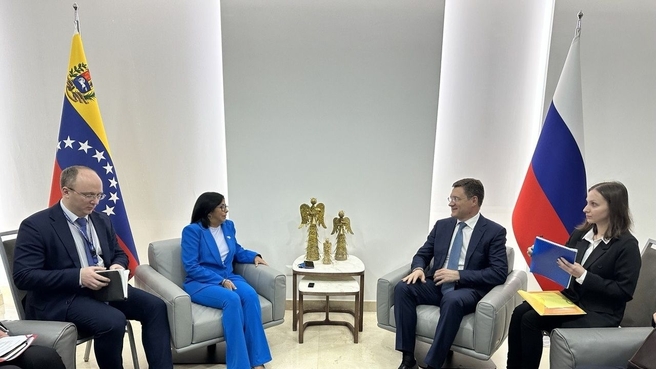Deputy Prime Minister Alexander Novak, Co-Chair of the Russian-Venezuelan Intergovernmental Commission, chaired its 16th meeting in Caracas. The two countries are marking the 20th anniversary of the commission in 2022.

Alexander Novak chairs the 16th meeting of the Russian-Venezuelan Intergovernmental Commission. With Vice President for Economic Issues, Minister of Oil, Bolivarian Republic of Venezuela Tareck El Aissami
Alexander Novak chairs the 16th meeting of the Russian-Venezuelan Intergovernmental Commission
Alexander Novak noted that Russia and Venezuela traditionally enjoy friendly relations that are bolstered by close political, trade, economic, cultural and humanitarian cooperation.
“Our countries are linked by solid traditions of friendship and trust. Venezuela remains Russia’s reliable and time-tested strategic partner in the Latin American region and the world. We jointly strive to build a more equitable polycentric world order. Our countries voice coinciding approaches to most issues on the global agenda, and work on expanding mutually beneficial trade, economic, financial, investment, cultural and humanitarian cooperation,” the Deputy Prime Minister said at the meeting. Moscow and Caracas agree on the need to make their economies more resilient; this is a high-priority task in conditions of a rampant Western sanctions campaign. It is possible to accomplish this by expanding comprehensive bilateral interaction, coordinating import substitution efforts and strengthening technological sovereignty.
The Deputy Prime Minister praised the allied nature of coordinated Russian-Venezuelan efforts at international venues, including within the OPEC + framework.
Alexander Novak noted that a joint hydrocarbons production had exceeded the planned output by 34 percent in January-October 2022. The parties are negotiating the delivery of Russian equipment and digital industrial technologies for the Venezuelan oil and gas sector.
Russian companies are ready to supply Venezuela with wheat, meat and dairy products to ensure its food security. Interest is growing among Russian importers in Venezuelan coffee and cocoa. In January-October 2022, Russia shipped 12 percent more fertiliser to Venezuela than in 12 months of 2021.
Russian pharmaceutical companies are ready to expand the range of products being shipped to Venezuela. This will make it possible to bring down the cost of vital medications on the Venezuelan market, making them more widely accessible. In 2020-2022, Caracas received about 24 million doses of anti-flu and anti-COVID vaccines, as well as over 7.2 million packs of insulin. There are plans to launch an insulin plant in Venezuela using Russian technologies in 2024. The plant is to manufacture over 3.7 million doses of insulin annually, which will eliminate Venezuela’s dependence on foreign shipments.
Venezuela is becoming a popular travel destination. Over 16,000 Russian holidaymakers have visited Margarita Island since the launch of a chartered flights programme.
During their talks, the parties noted substantial prospects for expanding bilateral cooperation in a number of fields, including the oil and gas and banking sectors, agriculture, transportation and tourism, the space industry, medicine, culture, science, and many others. During his visit to Caracas, Alexander Novak also met with Vice President for Economic Issues, Minister of Oil of the Bolivarian Republic of Venezuela Tareck El Aissami, and Executive Vice President and Minister for Economy, Finance and Foreign Trade of Venezuela Delcy Rodríguez Gómez.










